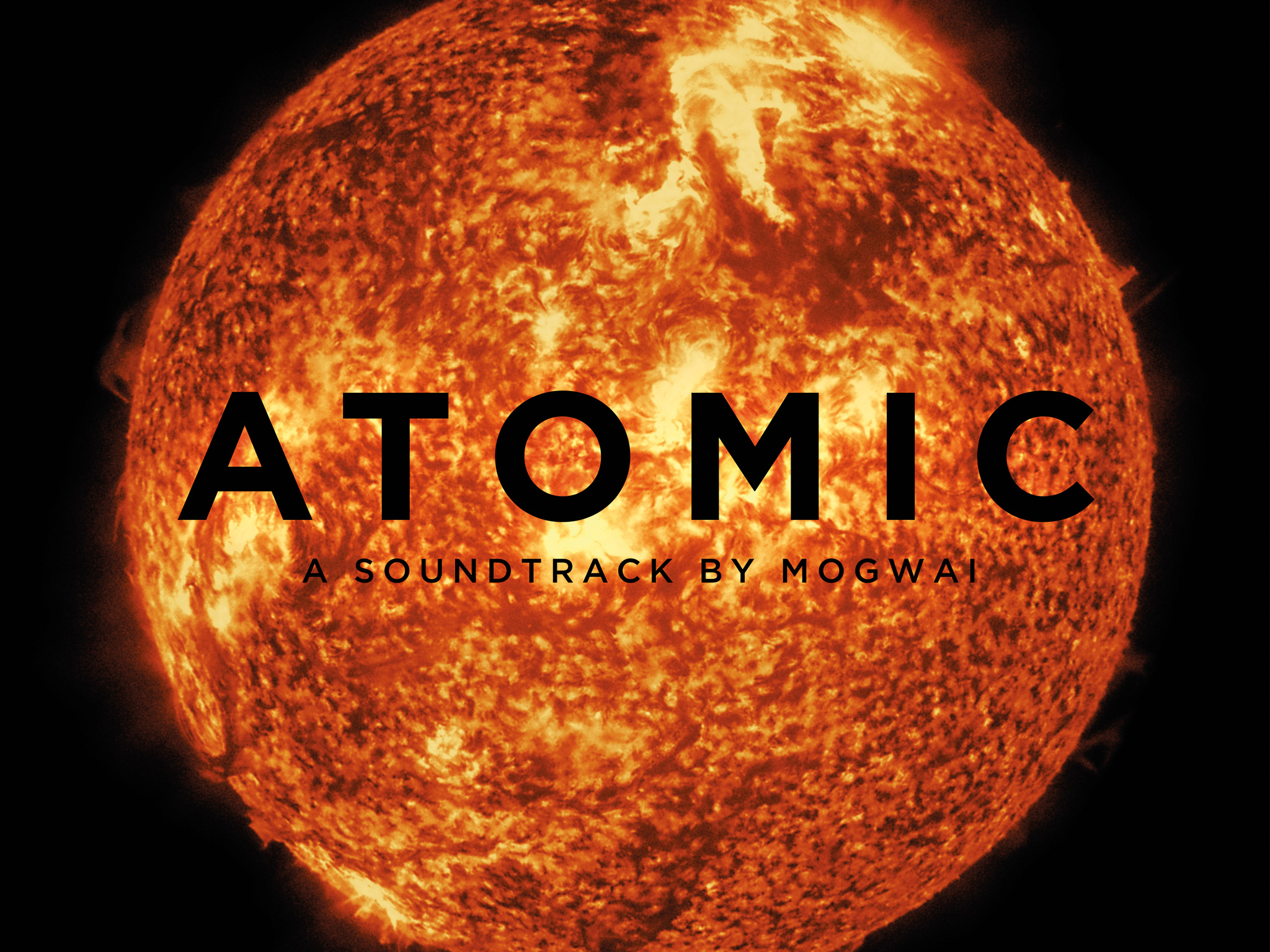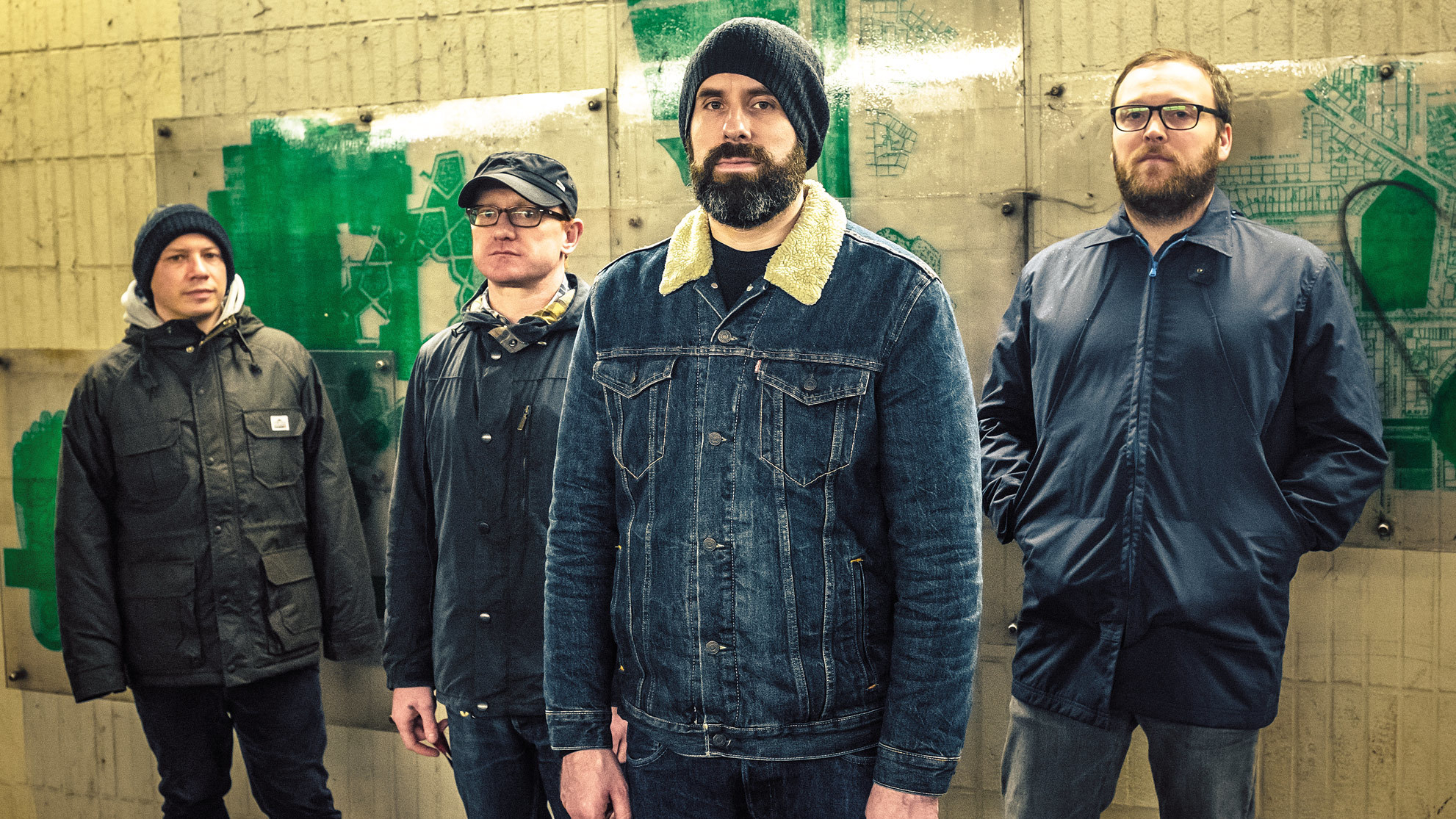A band like Mogwai, who are known for creating evocative instrumental soundscapes with a backdrop of deeply held political opinions, look like the ideal outfit to spend their career on soundtrack projects. So it’s perhaps a surprise that they’ve only worked on a handful of them to date.
Fortunately, their fourth soundtrack effort blends that evocative musicianship with just about the perfect topic for them: the question of how humanity is battling to take responsibility for its development of nuclear technology. Their music adds to the power of Atomic: Living In Dread And Promise, directed by Mark Cousins and first broadcast last year. The band later took the broadcast-specific material and reworked it into a 10-track album, Atomic, which was released earlier this month.
The subject matter is close to home. Guitarist Stuart Braithwaite and bassist Dominic Aitchison grew up in a world where the battle for nuclear responsibility is up close and personal. Glasgow, the third-largest city in the UK, lies just 28 miles from the port where the British nuclear arsenal is based. One mistake – political or physical – will mean the immediate end of everything they’ve ever known. They’ve lived with that since they were born, and it’s manifested in what Prog might call the ‘negatively triumphant’ nature of the soundtrack, which seems to hint at a perverse beauty of destruction.
“The whole thread of that 1980s tension of apocalypse, there’s a lot of that in the film, and in the music,” Braithwaite says, summing up the vibe. “But I think what I liked is that there are very separate themes. There’s the positivity of human discovery, the science of nature, then there’s all this bleakness. It was a challenge to rise to the drama.”
Trident submarines are running on Windows 95 – think about that when you’re trying to sleep.
Everyone in the west of Scotland of a certain age knows the doublethink they have to deal with on a daily basis. After the Second World War, they rebuilt schools in a rough ‘H’ form, leading to a rumour that the shape would diffuse a nuclear wind and save the kids. That was matched with the Protect And Survive near-horror movie public information films, advising you to hide in a den under a table if the fallout warning was heard. The reasons behind both were the same: to make it easier for troops to recover bodies in the aftermath.
Meanwhile, a precious few people, selected for their jobs, would be working in a now-revealed secret bunker near St Andrews, dealing with survivor’s guilt and the knowledge that it was unlikely they’d ever see daylight again. In Glasgow, you’re aware all that could spin out just 200 seconds from now. And yet you get up, go to work, have a pint, watch the game – you keep calm and carry on.
Braithwaite is frustrated about it. “I’m surprised there isn’t an absolute outcry,” he says. “I remember everyone just laughing at Pravda in the 80s. But here, now, there’s a state-owned media. In any kind of normal situation, there’d be an outcry. Did they not drive one of those missiles up the M4 during one of those big storms? And the Trident submarines are running on Windows 95 – think about that when you’re trying to sleep.”
Director Cousins crafted Atomic entirely from archive film, and took the opportunity to immerse himself in the world of physics, describing the world of weapons, X-ray and MRI scans as “abstract Star Wars”.
Braithwaite joins in. “I’ve got a friend who works at CERN. Me, him and Mark went out, and Mark was really picking his brains about the science, the discoveries, the bombs. I sat there and drank. I didn’t have a clue!”
However, he adds: “Most of it was educational. It’s a microcosm of humanity in a way: you make this discovery, and immediately someone does something horrible with it.
“The argument to renew Trident for £100 billion – for what? So you can sit at the top table? It’s just a wee island in Northern Europe. It doesn’t matter whether folk are scared of us. It’s like something out of Lord Of The Rings.”
When it comes to the guidance offered to Mogwai for their music, Braithwaite says it was of a very general nature. “I’d like to think we were brought in because they wanted our interpretation. Mark has a great mind for these things – he got really immersed in it too.”
They all had the same concepts in mind as the archive material unfolded. “The images spoke for themselves,” Braithwaite reflects. “There was no need to talk about it, especially the section with the explosions. You don’t need to talk about it – there’s not even much music over it.”
Naturally, the story of Hiroshima isn’t far from anyone’s minds. Mogwai have visited the Japanese city that, in August 1945, became the world’s first atomic bomb target, and they’ve even played there. “It was quite a strange day,” Aitchison recalls. “We arrived and went to the museum, which was quite affecting. Then we had to go on stage.”
They’ll play there again as they tour the Atomic album, performing the soundtrack alongside the movie. “It’s either going to be a really overwhelming experience or just a bit odd,” Braithwaite predicts. “It depends how people in Japan feel about it. I’m curious to know how they’ll take the film – it has a lot of Western propaganda from the time, which is quite horrible, given what happened.”
Unsurprisingly, movies feature prominently in Mogwai’s life – every night of every tour, to be precise. “After a show we go to the lounge to watch a horror movie,” Aitchison says of their Horror Lounge tradition.
“Mark, our merch guy, takes control of it,” says Braithwaite. “He’s got quite a strong stomach… sometimes the films are a little too challenging.”
“There’s always a full room when it starts, but by the time it ends, there’s like two people left every night,” Aitchison adds.
Horror and science fiction, especially 1970s material, has deeply informed the band’s approach to soundtracking. “A lot of people have commented that Atomic uses 70s-style futuristic sounds,” says Braithwaite. “The idea of futurism is a concept that never existed, except in people’s minds.”
However, it’s interesting to consider that the concept was heavily influenced by the advent of the nuclear age.
Silent Running, the 1972 sci-fi classic starring Bruce Dern, gets an honourable mention: “I’d say it’s a horror movie,” Braithwaite says.
Aitchison adds: “I remember seeing it for the first time on BBC2 on a Saturday night. ‘Oh wow, it’s got robots in it!’ I was so bummed out by the end of it.”
To date, the band have worked on four soundtracks – Zidane: A 21st Century Portrait, from 2006; The Fountain, the same year, in collaboration with Pop Will Eat Itself’s Clint Mansell and the Kronos Quartet; 2012 French TV series Les Revenants (The Returned); and now Atomic.

“Drone effects work really well,” says Aitchison when asked to sum up what they’ve learned. “We found it really hard to make drums work. They stand out. They don’t fit in well.”
“The 90s was a bad period,” Braithwaite says. “Something dramatic will happen and a 200-piece orchestra will go ‘da-da-daa!’ in a really complex way. I can see something dramatic is happening; I don’t need that too. That’s why the Tarantino films seemed so refreshing – he was choosing apt music, compared to the stupid orchestration.
“We’ve had directors wanting us to do something really over-the-top, which we do with our own songs, but to do that for a scene with something blowing up? The best soundtracks are where hardly anything’s happening in those moments.”
There’s another problem: “Quite often, by the time you get asked, people have been using temporary music,” Aitchison says. “They’ve got to like the temps, and they ask, ‘Can you make it more like that?’”
Braithwaite points out that this is what happened with 2001: A Space Odyssey: “There’s a score, and it’s pretty good, but it’s hard to beat The Blue Danube and all that.”
I remember everyone just laughing at Pravda in the 80s. But here, now, there’s a state-owned media. In any kind of normal situation, there’d be an outcry.
Another golden rule? “Get paid up front!” Braithwaite laughs. “We’re speaking from experience, but past experience. One time we pretty much scored a film, and the guy – it was his first film – didn’t understand that unmixed music sounded pretty rough. He couldn’t compute that the music we were sending him wasn’t finished.”
It didn’t end well.
The music and movie worlds aren’t a perfect match, and Mogwai have had to accept certain conditions they wouldn’t normally work under. Aitchison says: “One of the soundtracks we did, we had to do before we’d seen any finished footage. We had to kind of guess what would work.”
“It was a stab in the dark,” Braithwaite adds. “Which was quite apt, because one of the scenes was someone getting stabbed in an underpass…”
“It worked, luckily,” Aitchison continues. “But it’s quite different. It has to be really, really sparse; you have to keep it really simple with hardly any instrumentation and hardly any drums. And the time frame’s quite different as well.
Usually the music is the last thing to get done, so you’ve only got a short time to get it finished. We were really up against it, time-wise. But that’s the good thing about it as well – the process is very quick to getting a finished result.”
In fact, Atomic was broadcast less than a week after the band had submitted their final recordings. “Some of the music was written two days before we went into the studio,” says Braithwaite. “There was quite a panicky producer – I think the word ‘crisis’ was used at one point. But it was a great experience. It’s just working fast. It’s amazing what a motivating factor that can be. These days people spend a lot of time making records, but it’s amazing what you can get done quickly when you have to. We spent much more time on it when we were making the album.”
Atomic is Mogwai’s first project without guitarist John Cummings, who left last year, prompting the band to wish him well and announce they’d continue as a four-piece. Atomic is also definitely not Mogwai’s ninth album – that’s expected at some point in 2017.
“We’re writing at the moment,” Braithwaite reports. “We’ve got a studio booked in America at the end of this year. We’ve given ourselves a long time to do it, but we’ve got a busy year so we’ll still be up against it.”
After that, they’ll no doubt be hankering after some more soundtrack work – but what kind? Movies, television series, documentaries? “Really lucrative ones,” Braithwaite grins.
Glasgow has never had to face up to anything like the horror of Hiroshima. But if it ever does, it’s personally terrifying and yet artistically striking that some of the city’s own artists have created a notable soundtrack to its destruction.
Atomic is out now on Rock Action. See Mogwai’s website for more information.
